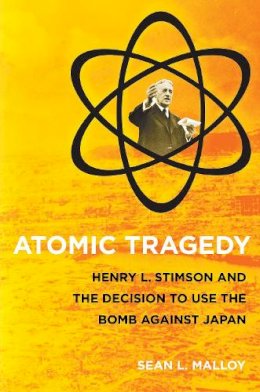
Atomic Tragedy: Henry L. Stimson and the Decision to Use the Bomb against Japan
Sean L. Malloy
Atomic Tragedy offers a unique perspective on one of the most important events of the twentieth century. As secretary of war during World War II, Henry L. Stimson (1867–1950) oversaw the American nuclear weapons program. In a book about how an experienced, principled man faltered when confronted by the tremendous challenge posed by the intersection of war, diplomacy, and technology, Sean L. Malloy examines Stimson's struggle to reconcile his responsibility for "the most terrible weapon ever known in human history" with his long-standing convictions about war and morality. Ultimately, Stimson's story is one of failure; despite his beliefs, Stimson reluctantly acquiesced in the use of the atomic bomb against heavily populated Japanese cities in August 1945.This is the first biography of Stimson to benefit from extensive use of papers relating to the Manhattan Project; Malloy has also uncovered evidence illustrating the origins of Stimson's commitment to eliminating or refining the conduct of war against civilians, information that makes clear the agony of Stimson's dilemma. The ultimate aim of Atomic Tragedy is not only to contribute to a greater historical understanding of the first use of nuclear weapons but also to offer lessons from the decision-making process during the years 1940–1945 that are applicable to the current world environment. As the United States mobilizes scientists and engineers to build new and supposedly more "usable" nuclear weapons and as nations in Asia and the Middle East are replicating the feat of the Manhattan Project physicists at Los Alamos, it is more important than ever that policymakers and analysts recognize the chain of failures surrounding the first use of those weapons at Hiroshima and Nagasaki.
Product Details
About Sean L. Malloy
Reviews for Atomic Tragedy: Henry L. Stimson and the Decision to Use the Bomb against Japan
Library Journal (starred review)
Sean L. Malloy's richly detailed, well-argued book is the latest addition to the growing literature on Stimson that offers a critical analysis of his role in what is arguably the most momentous U.S. defense and foreign policy decision of the modern era—to use nuclear weapons against Japan and as a diplomatic tool against the Soviet Union. Malloy's goal is daunting, especially in a relatively brief book, but he achieves it surprisingly well. Making extensive use of archival resources, Malloy employs the lens of biography to recapture Stimson's complicated relationship to the bomb and the context of its use.... This book is a well-written, informative, judicious account that will be useful to historians as well as policy analysts and ethicists.
Monroe H. Little
Journal of American History
Showing originality, Sean Malloy approaches the decision to use the bomb from the perspective of a key player, Secretary of War Henry Stimson, who had a record of opposition to indiscriminate attacks on civilians, evident misgivings about the prospective use of the atomic bomb, and concern about the implications of its use for future peace and security.
Lawrence D. Freedman
Foreign Affairs
Using the life and perspective of the erudite, elitist, loyal, compassionate, and complicated Secretary of War, Henry L. Stimson, to drive his narrative forward, Malloy examines the development of the bomb and the decision to use it. Anyone looking for a review of atomic bomb scholarship as well as a sense of the actual decision-making process will find Malloy's thoughtful and very accessible account both enlightening and thought provoking.... Atomic Tragedy is well worth the read.
Jonathan F. Phillips
Military History of the West
